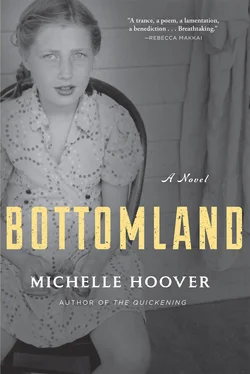Then it was summer. It was late afternoon. Myrle was walking across the meadow in her bare feet, her fingers sweeping the grass. Her white-blond hair was dark and wet against her neck. On her back, the blue crepe. The fabric was soft and slim around her waist, the fit only just loose enough at her chest and hips. I couldn’t help but think how fine the dress was, how my needle had done that — and the way she walked in it, a pale spirit. Where’s she going? I asked my sisters. Agnes shrugged. To see a friend , Esther sung out. It was the last time I would see Myrle wear that dress. I would love if she could wear it again. I would bleach it clean, take my needle to the tears and hide them in new pleats — but Myrle was too far off now across the meadow to call back.
“Nan, Nan.”
I woke. The room seemed clear to me again. A man sat close to the bed. I knew his voice before I knew him.
“Carl.” I smiled at him and he drew his hand over my forehead.
“You’re awake.”
“I guess.”
“They were worried about you. Agnes thought I might be a help.”
Agnes sat on the other side of the bed. Her cheeks were raw, her hair twisted in a bun.
“Where are the others?” I asked.
“They’re in town.”
I tried to sit up, but Carl pressed a hand to my shoulder.
“Why ever for?” I asked.
Agnes stuttered and it was Carl who took my hand. He nodded to Agnes and she bit her lip.
“They found a girl,” he said.
“The girls came home?”
Carl shook his head. “A girl in the river. They don’t know who she is. The others have gone to find out.”
In the year 1892 I was a young man of little more than thirty, stealing passage from an old German woman who expired on the docks before she was boarded. She had blue cheeks in the time I discovered her. Her woolens were so thickly bound about her throat and chest I never could hope to save her, long past saving as she was. Her hand rested stiffly on her stomach. Her ticket wavered from the tips of her fingers as if offering it up. I touched her wrist and felt it cold, gazed back at the foreign village where I was friendless and sure to starve, and slipped that ticket from her grasp. God forgive the young their desperateness. Now nearly as old, I would pay for such unhappy luck. Yet little had I known of its opposite even then.
In the weeks as they passed, I stayed secreted on that ship, securing room for myself in the lower berths. I was a farm boy with a rent in his trousers. I reeked of pigs. If spied on the decks, I feared I would in an instant be pitched overboard, a trespasser no matter what ticket I held. In the evenings when the skies closed and the storms fell, I sweated in my bunk. The air was so very dense with smoke and stench my head itched. They offered us a mattress stowed with seaweed. A life preserver for a pillow. A tin pail for meals of herring and soup. My stomach turned. The lamps on such rocky waters were too dangerous to light. I tucked my knees to evade the rats. Still the ocean swells plagued my sleep. I stood in the mornings so sickened, I doubted I had opened my eyes.
In the daytimes, I dared walk the decks to escape the hordes below. When I grew tired, my legs unsure, I hid behind the vents and surveyed the horizon for land. One week more. One dreaded week. The engines of the ship bore on. On the upper level, a woman perched her child on the rail, gripping only his waist. The child was small, barely two years old. He was calm as he looked out. The woman cooed to him under her hat. She had a lovely pale face, little younger than myself. A ribbon bound a nest of hair off her neck. The hair was a fiery red, her cheek the whiter against it, and I felt a stirring when the wind lifted her skirt from her ankles. Now and again, she closed her eyes. Her fingers loosened from the waist of that jumper. The child was oblivious. He leaned forward in the arms of his mother, reaching for the sea.
When must we learn to fear? And if not from our parents, from whom?
I missed the land my father worked. I missed the house where my mother had me born. Sitting on deck on those dull waters, I missed my boots on the soil. In the dark of the evenings, I imagined that old woman as she snatched her ticket back. This voyage had taken from me something I never would have dreamed. My assurance there was a place for me. The steadiness of my limbs. Home. The idea alone is not solid enough to carry with us. Yet without it, on what can we stand? If I reached the far side, I prayed the new world proved steady. I might place my feet on the ground, build a life worth these many miles. Once I achieved that, I vowed I would leave the good earth never again.
I am an old man now. I sleep in my slippers because my feet grow cold. I know men who sleep far deeper than I. I know women who visit them in churchyards. Yet I cannot truly sleep in any sense of the word. The room is dark. I tug at my blanket. What a waste of time the evening is for the old. All those many hours between sunset and sunbreak. When I close my eyes, the swells of that sea always are with me. The never-ending tide of the river against its banks. How often I tried to keep the waters under my thumb. How much they have from us stolen. If the old woman and her ticket laid a curse, I have seen it play itself out, once and again. Why might a man lock the doors of his house? Why can he never forget the trespasses against him? He makes his confession. Yet confessing never erases the act. Try as I might, the language is wrong. The sentences slip. My ease with the old tongue is fading, and I am left only with this English. Its many contradictions. Its twenty ways of saying one thing.
Years ago when I stood on the deck of that ship, the sea reflected the sun. It lit my face from beneath. I believed I might go blind from the light. Even now I blink when I think of it. Me, only thirty-three and ignorant of everything save for what I could grow with my own hands. Born as I was a farmer. Raised in the northern German lands of wheat. The rest of my life, I learned little I would find important. About war, perhaps. About children and the duties of family. Yet these were not light. I could not make of them that.
When at last they released me from that prison Ellis Island, I wandered the streets of the city for a place to lay my head. With difficulty, I found boarding and determined to use it well. For two days I slept. Still I believed myself drifting on that ocean. On the third, a noise stirred me. A man stood next to my cot. His knees pressed into my mattress. I shared the room with a dozen others, and we had avoided so much as a glance. This man was short, powerfully built. He wore nothing save a stained undershirt, his naked arms and legs masked with hair. His breath more than stank. He watched me until certain I was alert, cleared his throat and puckered his lips. I turned my face. He let out a low guttural noise then, insulting me in some foreign language. In my innocence, I shook my head. Without another word he hurried to the toilet. From that room I heard worse from the man. His stomach seemed to drop out of him whole, leaving him gasping. When at last I sat up, I felt dizzy. Disjointed from my sleep. A spot of wet stained the blanket that lay across my chest. It was no larger than my thumb and just as harmless-seeming. Yet I remembered that man clearing his throat and understood such a spot never came from me.
Sleep on, Julius. Sleep on. The man had shared his pains as punishment. But for what crime? Come morning I would make my escape and discover the land they promised.
Early the next day, I packed my meager belongings and wandered the streets. I had often heard about the land in the west. New York seemed to promise little of such openness. How was it that its people settled on top of one another, never to fear trampling? In the afternoon, the streets shimmered with heat. I found only a bench in a park to give me rest. A church bell called once and again. I counted the bills that lined my wallet, wishing there were more.
Читать дальше












